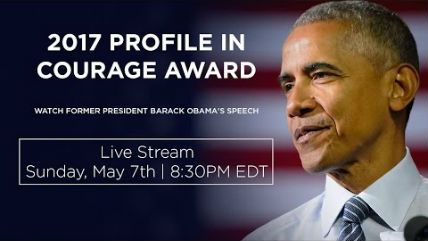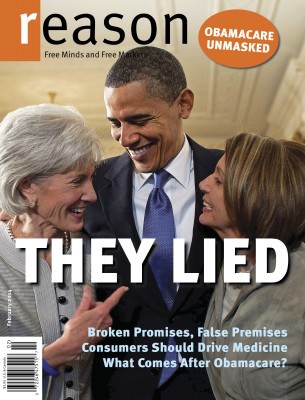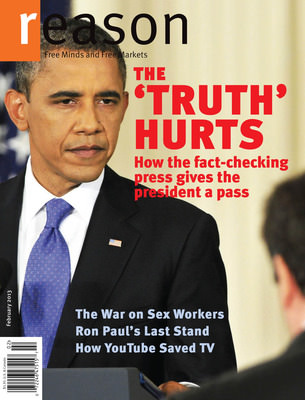'Lie of the Year' Winner Barack Obama Admonishes Congress to 'Speak the Truth' About Obamacare
Uh, better late than never?


Sunday night, former president Barack Obama received the 2017 John F. Kennedy Profile in Courage Award from the JFK Presidential Library and Museum in Dorchester, Mass. "I am humbled by this evening and to be honored by a family that has given this country so much," the 44th president said. Caroline Kennedy, Obama's ambassador to Japan, gave a speech. James Taylor opened. I'm sure a lovely time was had by all.
The headlines from the event wrote themselves: "Barack Obama Calls on Lawmakers to be Courageous in Opposing the Republican Health Bill," "Obama calls for 'courage' to oppose Obamacare repeal," etc. Media commentators re-swooned over the former president's "American eloquence." And yet the address embodied much of what made both Obama's rhetoric and his signature legislative achievement so annoying the first time around, and so par for the course in a 2017 season of barely contained political-class hysteria over yet another ill-conceived health-system overhaul.

From his career-making speech at the 2004 Democratic National Convention, to his first State of the Union Address*, to his Obamacare pitch in front of Congress in September 2009 and beyond, Barack Obama has made a near-art out of portraying himself as above the distasteful partisan scrum that seeks to artificially divide Americans, while seeming unusually willing to engage in self-critical introspection. Amid the ensuing din of applause from both grandstand and press box, only a few scattered observers from the cheap seats notice that this rhetorical device is routinely coupled with a political shiv to the ribs, often in the form of a straw man argument that assumes the worst about the opposing team.
Hundreds of thousands of words have been spilled about Obama's 2004 DNC speech, particularly his famous peroration that "There's not a black America and white America and Latino America and Asian America; there's the United States of America." But who now recalls that that extended rumination on national unity ended with the decidedly one-sided kicker, "[O]ut of this long political darkness a brighter day will come"? In the honeymoon glow of his February 2009 address, almost no one pointed out that there were inherent contradictions between such statements as "[W]e cannot afford to govern out of anger, or yield to the politics of the moment," and "This time, CEOs won't be able to use taxpayer money to pad their paychecks or buy fancy drapes or disappear on a private jet." Obama's rhetoric has always been ready to champion the notion of "going high," while making sure to land some low blows along the way.
So it was Monday night. "For many Americans I know that this feels like an uncertain and even perilous time," Obama said, setting up the head-fake. "And at such moments, courage is necessary. At such moments, we need courage to stand up to hate not just in others but in ourselves. At such moments, we need the courage to stand up to dogma not just in others but in ourselves….At such moments, it's necessary for us to show courage in challenging the status quo and in fighting the good fight but also show the courage to listen to one another and seek common ground and embrace principled compromise."

Sounds like a prelude to opponent-empathy and searching moral inventory, right? Only if you have failed to detect a decade worth of Obamaite straw men and false choices:
I hope that current members of Congress recall that it actually doesn't take a lot of courage to aid those who are already powerful, already comfortable, already influential. But it does require some courage to champion the vulnerable and the sick and the infirm, those who often have no access to the corridors of power.
There it is: The assumption that those who would seek to revamp the Affordable Care Act are driven primarily by a desire to help the one percent get one percenter. I have a low opinion of lawmakers in general, and suspect openly that even those few in Congress who I am more ideologically sympatico with are making some pretty crass political calculations in supporting the crappy American Health Care Act, but if I were to yield to the prejudice that the legislators who disagree with my policy preferences (meaning: most all of them, most all of the time) do so because their intentions are to do evil, then at minimum I'd be doing a lousy job of journalism. Politicians may be narcissistic and self-deluded and driven far more than they'll ever admit by the transactional necessities of winning re-election, but if you dismiss all their stated motivations out of hand, you deprive yourself of predicting what dreary act of statism they'll dream up next. Say what you will about the tenets of Jeff Sessions, but at least he has an ethos, and understanding how he imagines that he's doing good will help you prevent him from doing more bad. Same goes for Bernie Sanders.
Obama's purported high road is even less convincing when he complains that Obamacare "was easily subject to misinformation and fearmongering." More on that, from the winner of Politifact's 2013 "Lie of the Year":
[I]t is my fervent hope and the hope of millions that regardless of party, such courage is still possible, that today's members of Congress, regardless of party, are willing to look at the facts and speak the truth even when it contradicts party positions.
You know what? That was my hope, too, back in 2009. And 2010. And '11, '12, and '13, and '14, for that matter. In fact it is still my hope now, even given the President Donald Trump's unfamiliarity with health policy, relativistic approach toward the truth, and the fabulisms that AHCA supporters such as House Speaker Paul Ryan (R-Wisc.) are making in the wake of its party-line passage.
I would find Barack Obama more believable about speaking truth to power if he volunteered more than just a stammering semi-acknowledgment of the whole "you can keep your doctor" whopper, and then went on to cover the sundry other Obamacare dishonesties, from gaming the Congressional Budget Office within an inch of its life, to claiming that increased preventative care would save money, to serially misportraying the Affordable Care Act as a victory over "special interests." And we will probably wait in vain for specific declamations of fearmongering from his own side. But I suppose hypocrisy is the tribute vice pays to virtue, etc.
* Yeah I know that presidents' first such addresses are technically labeled "Speeches to a joint session of Congress," but they have become the same in every other respect, and we need a blanket term to cover both, so.


Show Comments (86)